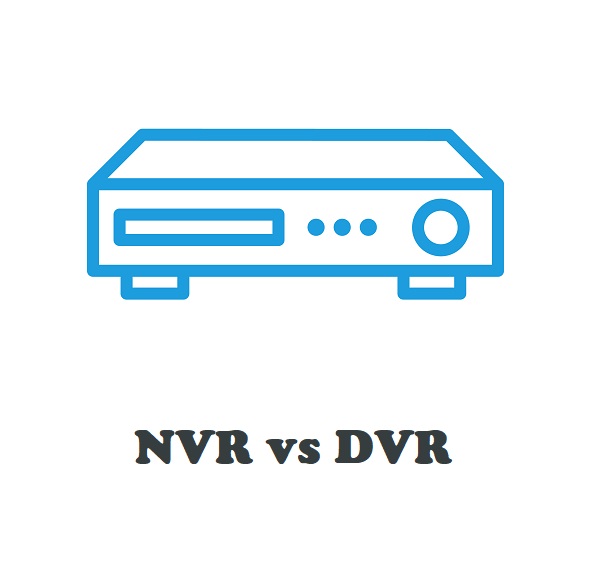A Network Video Recorder or NVR is a “VCR” like set-top device whose primary purpose is to store surveillance video. Modern NVR’s store video from cameras that utilize traditional internet networks – known as IP cameras. An internet protocol camera (or IP camera) is a digital camera that can transmit and receive data over the internet using either Wi-Fi or through an Ethernet cable. Internet protocol cameras capture images like an ordinary digital camera and compress the data files to transmit over the network.
NVR Systems Explained
NVR systems store data on external or internal storage devices, like disk drives, flash drives, memory cards. Network Video Recorder is used to record CCTV camera streams 24/7.
NVR Vs. DVR
Both NVR and DVRs function is to store video, but NVRs are the more modern iteration. As discussed above, NVRs use IP networks (the internet) to transmit and receive data. NVRs typically offer more functionality, like allowing users to log in and view the data remotely.
DVR or Digital Video Recorder is the older version of NVR. DVR systems are most common with analog camera systems. Analog cameras are older tech requiring large VHS tapes or hard drives to store the data. They do not usually connect to IP networks, so remote viewing across the internet (or a mobile device) is limited.
NVR
Pros
• NVR system can record video and audio
• Has better Image quality
• Flexible system
• Better Video Coverage
• Can use cable or wireless
• Uses one cable for audio, video, and power
• High-resolution video can identify faces, license plates, and text
Cons
• Expensive
• Software is harder to use
DVR
DVR system uses analog cameras. The analog cameras can’t process video footage, but instead, it streams raw video footage using coaxial cables. The footage is transmitted to the recorder via a coaxial cable. A DVR system uses coaxial cables to connect the camera rather than an Ethernet cable. Because a DVR is analog, you will not be able to download the files to a computer or access the videos across the internet.
Pros
• Cheaper than NVR system
• Easy to use, and set up
• Standard image quality but can be HD
Cons
• It has a lower frame rate and lower image quality than the NVR system
• Needs few cables for audio, video, and power
• Complex installation
• Separate power source
• Less coverage
• Can’t store video. It can only stream video, and it can’t record audio
Both NVR and DVR systems record video data and are proven reliable. If you want a better quality image, you can choose the NVR system. Although the two systems are relatively the same, the difference between the two comes down to the cost, how the data is transmitted, and the type of camera it uses. The NVR system is far better to use today than the DVR system. But, the NVR system is more expensive, and the software is harder to use.
Why Do You Need an NVR?
There are many reasons why you need an NVR. Whether you’d like one to be installed on your house or in your business, a video surveillance camera can give you extra security. It can protect you from theft, burglary, intrusions, and other events. An NVR system records video in a safe location. The video footage can be monitored on your computer or smartphone inside your home. You can leave your camera always on so it can capture more video footage. The captured video can also be stored on centralized storage like hard drives, memory cards, and other storage devices.
What to look for when buying an NVR?
There are many things that you should know when buying an NVR. Before rushing to the store to buy an NVR, know first what kind of NVR would you get as each of them has different features, storage size, and price. Below are some things to consider before buying your NVR.
Storage Size
How much storage do you need? The answer to this question is straightforward: if you use an NVR on your home, you could get 1-4 terabytes of storage size for more extended archival storage. If you’re using it on a business, it’s recommended that you use eight terabytes or more for more high-quality video footage and long archival storage for security purposes.
Mobile Application
NVR has a feature that can connect your video feed to your smartphone. There are software applications that can monitor live camera images from NVR to your smartphone.
Number of Current Camera Streams
An NVR system can connect a maximum of 9 camera network. This feature is excellent if you are using it for your business. It will give you a wider area of video coverage perfect for security.
Storage Drive Included
Some NVR has a built-in hard drive for storage but doesn’t expect it to be big. You can always upgrade your storage using Hard drives, USB flash drives, and any storage device type.
Is it Brand Agnostic?
It would help if you looked for an NVR that accepts any camera brands. Not all NVR are brand agnostic; some only allow their own branded cameras to stream the data. We recommend purchasing a brand agnostic NVR because you won’t get locked into a particular manufacturer.
Does an NVR Need a surge protector?
All types of cameras are susceptible to lighting, so the answer is YES. Lightning strikes can cause severe damage to an IP camera, or even worse, it can pulverize it. A protective camera hit by lightning can damage other devices that are connected to the camera. So you need a surge protector to protect your surveillance camera, especially if it is always-on.
Cellar Door: Your Professional Security Camera Installation Service
Cellar Door provides professional CCTV and Security Camera installation services that include NVR and DVR options for our clients. If you need help installing a CCTV system, do not hesitate to contact us
